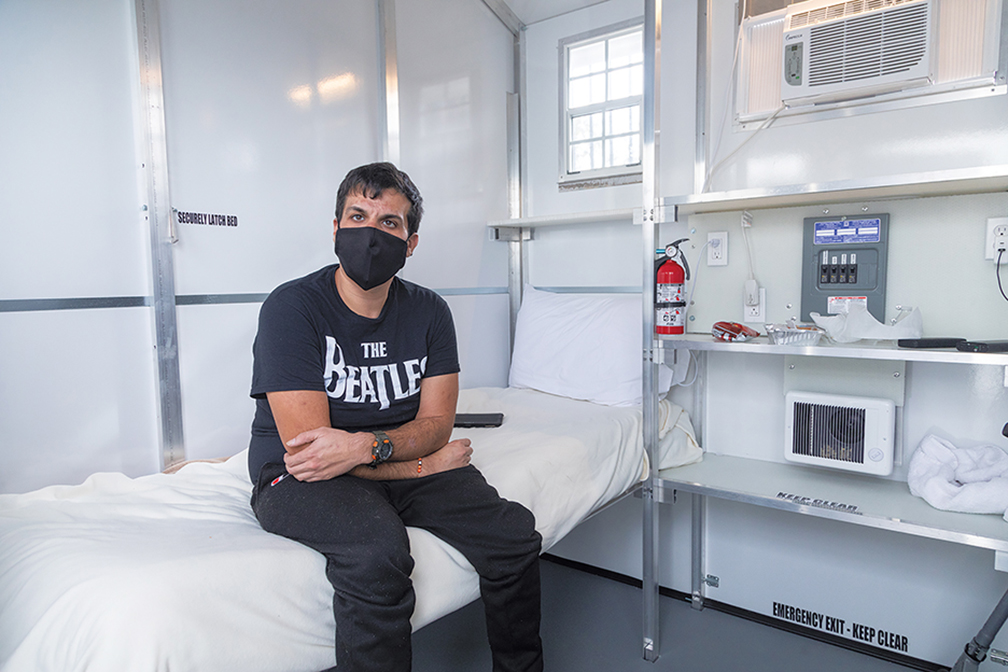Seeing results, city attorney Mike Webb wants more help for Redondo homeless program
by Garth Meyer
With progress made in reducing homelessness in Redondo Beach, City Attorney Mike Webb is asking for three items in the next city budget to further the work.
Webb and staff members made a presentation May 10 to the city council before June budget talks.
Recommendations were to hire a full-time mental health clinician, create an education campaign centered on an alternative way to support panhandlers and add a part-time employee to find and manage the rental of more housing units in which the city may place people.
Updating the council, Webb said 71 people went through homeless court this year; 26 people found permanent housing from the pallet shelter and all 15 units at the shelter are still occupied.
A waiting list has fluctuated from five people up to 20.
Lila Omura, the city’s new Homeless Housing Navigator has helped 10 people, not necessarily part of the pallet shelter, to be “permanently housed” – through qualifying for a Section-8 voucher capping rent at 30 percent of their income. New buildings have been built for this federal program, such as a 100-unit complex in Inglewood.
Five other people in Redondo Beach this year have been placed in “crisis housing” – for those particularly in need of medical aid. One was a paralyzed man often at the front of Rite Aid on Pacific Coast Highway, across from the city’s main library.
“These type of individuals are my heart,” Omura told the council.
Aside from the pallet shelter by the Galleria, the city rents five apartment units in Wilmington – making for 20 total beds to offer to the homeless.
Asking
The requested education campaign would discourage panhandling by establishing a fund for targeted help.
“People in Redondo Beach are very generous – but sometimes that generosity encourages people to continue living on the streets,” Webb said.
He told of panhandlers at a transit drop-off by Ralphs at 182nd & Hawthorne.
“(Omura) has come across individuals with far more cash on them than all six of us combined,” Webb told the five-member city council.
The way the program works is as follows; if someone knows of a panhandler or homeless person in a certain location, they may donate to the fund for that specific individual.
“Designated for this person at this location, and we’ll respond,” Webb said.
If the subject refuses the help, the city holds the money for another homeless person who is receptive.
The fund, originally started with $20,000 the city was awarded from a nuisance property lawsuit earlier this year, got an added $2,000 in a collection at the Easter service at Veterans Park.
Questions
Webb’s top request is to hire a mental health clinician to help when a case does not rise to the level of a 72-hour hold.
If the council approves of such a hire, the city attorney hopes it is someone like Omura, who started in January.
“I can’t promise that the next employee will have been described as an angel,” he said.
Councilman Nils Nehrenheim asked about getting the Beach Cities Health District (BCHD) involved with this.
“We’re shouldering all these costs on our own and this is a regional issue,” he said.
Webb responded that Nehrenheim’s concern with the ongoing cost is valid, but that the BCHD does not have the mental health professionals for the task.
“We want to have control,” Webb said, explaining that the homeless court’s results, in particular, may attract more county and state funding.
“When we first reached out, it was just an idea,” he said. “Everyone wants to get behind something that’s working well.”
The pallet shelters earned a mention on a recent episode of CBS’ “NCIS: Los Angeles,” with a police officer telling a man underneath a pier that she “just got word of an opening at the pallet shelter in Redondo.”
Webb noted the creative license – there have been no openings (without being on the waiting list).
The council voted 5-0 to receive and file the report before budget talks.
“I think we’re making a huge difference in the city for people experiencing homelessness,” said Joy Abaquin Ford, the city’s quality of life prosecutor.
Origins
City councilmember Laura Emdee pointed out later that one key to the broader homelessness crisis was a 2018 federal ruling on a lawsuit known as Martin vs. Boise, filed by a group of six homeless people in Boise, Idaho in 2009. The ruling decreed that a city could not enforce anti-camping laws without being able to offer a bed in return.
“We can’t enforce our laws in Redondo Beach until we can offer beds,” said Emdee.
The ruling was from the U.S. Circuit Court of Appeals, Ninth District, which encompasses Washington, Oregon, Idaho, Montana, California, Nevada, Alaska and Hawaii.
As of now the 15 Redondo Beach pallet shelters are limited to one person because of the pandemic.
Omura noted that the advantage of having the city’s own mental health professional is to not have to wait for the county, as cases can get backed up.
“Sometimes it takes weeks to get a clinician to come to Redondo,” she said. ER


